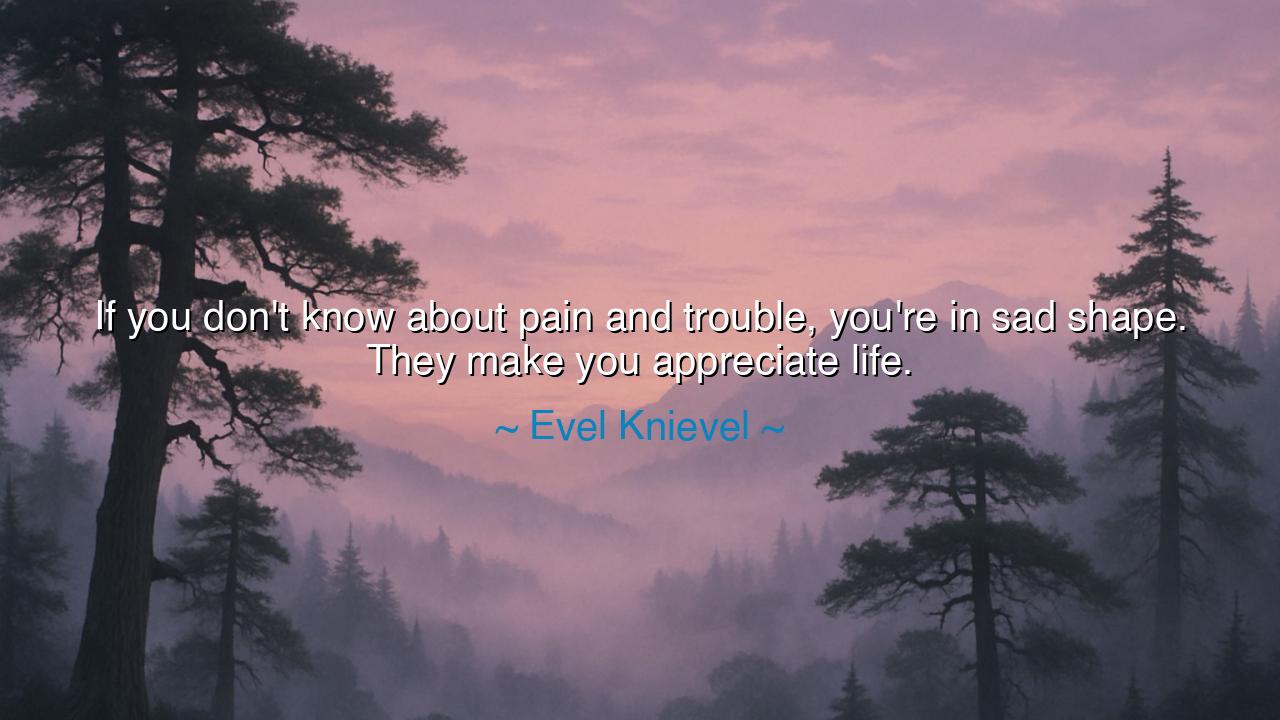
If you don't know about pain and trouble, you're in sad shape.
If you don't know about pain and trouble, you're in sad shape. They make you appreciate life.






In the daring and hard-won words of Evel Knievel, the legendary stuntman who lived more lives in one lifetime than most could dream, there is a truth forged in the crucible of danger: “If you don’t know about pain and trouble, you’re in sad shape. They make you appreciate life.” This is not merely the wisdom of a man who risked his body—it is the philosophy of a soul that understood the sacred role of suffering in awakening gratitude. Knievel’s words remind us that to live without challenge, without the sting of loss or the ache of effort, is not a blessing but a deprivation. For it is only through pain and trouble that the heart learns to cherish joy, and the spirit discovers what it means to endure.
Evel Knievel was not a man who feared hardship; he was one who danced with it. Throughout his career, he broke more than 400 bones, defied death countless times, and yet continued to climb back upon his motorcycle with the same fire that drove him as a boy. His life was a testament to the ancient truth that suffering refines the soul. When he spoke of appreciating life, it was from a place of scars and survival. He had known the searing pain of shattered bones and the long silence of hospital rooms—and yet he smiled, for every injury was also proof of having lived fully. Through struggle, he had come to revere life not as a comfort, but as a miracle.
The ancients, too, knew that pain was the great teacher of the human condition. The Greek philosopher Heraclitus wrote, “Out of discord comes harmony; out of struggle, greatness.” To the Stoics, such as Epictetus—himself once a slave—pain was not an enemy but a guide. It stripped away illusion and vanity, revealing what was essential: courage, discipline, and gratitude. Likewise, Knievel’s creed mirrors that of the warriors and sages of old—that the soul cannot grow without friction, that the sweetest joys are born from the bitterest trials. The one who has never fallen can never truly rise.
History is filled with those who, like Evel Knievel, turned pain into wisdom. Consider the story of Nelson Mandela, who spent 27 years in prison, separated from family and freedom, yet emerged not with vengeance, but with grace. When he said, “I never lose. I either win or learn,” he echoed the very spirit of Knievel’s words. Through trouble, Mandela learned the value of peace; through suffering, he came to appreciate life’s simplest treasures—the warmth of the sun, the laughter of others, the power of forgiveness. His pain became not his prison, but his preparation for greatness.
In Knievel’s view, those who live sheltered lives—who avoid hardship and fear failure—are, in truth, the most unfortunate. For without pain, one’s understanding of happiness remains shallow; without trouble, one’s appreciation for calm is dim. A person untouched by struggle does not yet know what it means to live. It is the very contrast—the darkness against the light—that gives life its meaning. Just as a pearl is formed through irritation and pressure, so too is the human spirit shaped by adversity.
From his words we draw a timeless lesson: do not flee from pain, but face it with open eyes and a courageous heart. Every difficulty, every heartbreak, every failure is not a punishment, but a teacher sent to awaken you to your own strength. When you stumble, rise again; when you fall, learn. Let suffering carve depth into your soul, for that depth will one day hold your joy. The ancients called this transformation metanoia—a turning of the soul, where pain becomes wisdom, and wisdom becomes peace.
So, O listener, remember Evel Knievel’s creed when you face life’s storms: pain and trouble are not signs that life has turned against you—they are signs that you are truly living. Do not curse them; thank them. They remind you of your resilience, your courage, your capacity to grow. When you rise from the ashes of hardship, you will see the world anew, not as something owed to you, but as something precious and fleeting. And in that moment of gratitude, you will understand, as Knievel did, that life’s greatest beauty is revealed not in its ease, but in its endurance.






AAdministratorAdministrator
Welcome, honored guests. Please leave a comment, we will respond soon